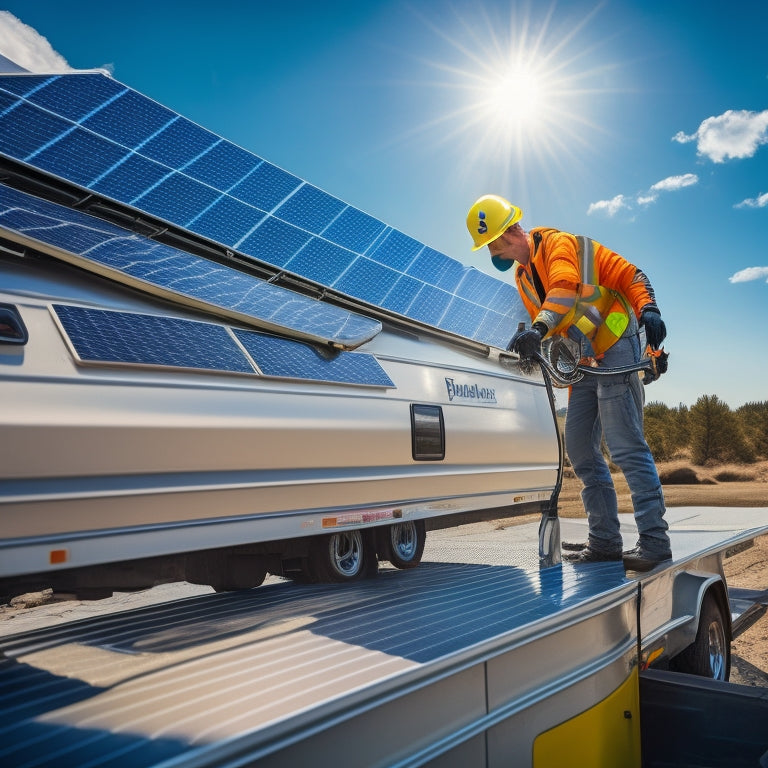
7 Best Tips for Solar Panel Maintenance on Wheels
Share
You're on the move with solar panels on your vehicle, but dirt and debris accumulation can reduce energy-producing capacity by up to 25%. Stay on top of maintenance to avoid this loss. Regularly inspect your panels for debris, and clean them gently with mild soap and water. Avoid using abrasive materials that can damage the panels. Check electrical connections often and monitor energy output closely. Perform routine deep cleaning sessions and store your vehicle in shaded areas when possible. By following these tips, you'll maintain your solar panels' efficiency. Now, discover more strategies to optimize your solar panel performance on the go.
Key Takeaways
• Regularly inspect and clean solar panels with gentle solutions and soft-bristled brushes to maintain efficiency and prevent damage.
• Monitor energy output closely to identify performance issues and detect anomalies, using data visualization tools to track trends and patterns.
• Prioritize water efficiency in cleaning processes and choose eco-friendly, biodegradable products to minimize environmental impact.
• Check electrical connections regularly to ensure safety and efficiency, and address potential problems promptly to prevent energy losses.
• Optimize panel exposure to sunlight by planning parking strategies and routes, and consider shade optimization by parking in shaded areas.
Inspect Panels Regularly for Debris
Regular inspections are essential to guarantee that your solar panels on wheels operate at peak efficiency. It starts with checking for debris accumulation. You can't afford to let dirt, dust, and other obstructions compromise your panel's performance. Debris accumulation can greatly reduce your panel's efficiency, leading to decreased energy production and increased maintenance costs.
By inspecting your panels regularly, you'll be able to identify and address any issues before they become major problems.
When inspecting your panels, look for signs of debris impact, such as dirt buildup, leaves, or bird droppings. Check for any blockages that may be obstructing sunlight from reaching your panels. Make sure to inspect the entire surface, including the frames, glass, and connections.
A clean and clear panel surface is vital for optimal energy production. By staying on top of debris removal, you'll be able to maintain peak panel efficiency, ensuring you get the most out of your solar panels on wheels.
Clean Panels With Gentle Solutions
When cleaning your solar panels on wheels, you'll want to use gentle solutions to avoid damaging the surfaces, as harsh chemicals or abrasive materials can strip away the panel's protective coating or scratch the glass. This is essential for maintaining panel durability and ensuring peak energy production.
To clean your solar panels effectively, follow these gentle solution guidelines:
-
Mild soap and water: Mix a small amount of mild soap with distilled water to create a gentle cleaning solution. This will help maintain water efficiency and prevent mineral buildup.
-
Soft-bristled brush or cloth: Use a soft-bristled brush or a lint-free cloth to wipe away dirt and debris, ensuring a scratch-free surface.
-
Deionized water rinse: Rinse your solar panels with deionized water to remove any soap residue and prevent mineral buildup.
Avoid Using Abrasive Materials
When cleaning your solar panels on the go, you'll want to avoid using abrasive materials that can scratch or damage the surface. Instead, opt for gentle cleaning methods that won't compromise the panel's integrity.
Gentle Cleaning Methods
When cleaning your solar panels, it's crucial to prioritize gentle methods to maintain their efficiency and longevity.
Here are three gentle cleaning methods to adopt:
-
Microfiber cloths: Use soft, microfiber cloths to wipe away dirt and debris. These cloths are gentle on the panels and effective at removing dirt.
-
Water efficiency: Utilize a water-efficient cleaning system to minimize water waste. This is especially important for RV owners who may have limited water supply.
-
Mild soap and water: Mix a mild soap with water to create a gentle cleaning solution. Avoid using high-pressure washes or harsh chemicals that can damage the panels.
Harmful Chemical Avoidance
You should never use abrasive materials or harsh chemicals when cleaning your solar panels, as they can scratch the surface or damage the protective coating. These damages can lead to a significant decrease in energy output, which defeats the purpose of having solar panels in the first place.
Instead, opt for biodegradable alternatives that are specifically designed for solar panel maintenance. Look for eco-friendly suppliers that offer gentle and effective cleaning solutions. These products are formulated to remove dirt and grime without harming the solar panels or the environment.
Remember, it's essential to prioritize the longevity and performance of your solar panels, and using harsh chemicals can have long-term consequences. By choosing eco-friendly cleaning products, you're not only protecting your investment but also contributing to a more sustainable future.
Make the right choice and invest in gentle, eco-friendly cleaning solutions that will keep your solar panels running at their best.
Soft Brush Selection
Selecting the right soft-bristled brush is essential for effective cleaning, as it helps dislodge dirt and debris without scratching the solar panel's surface. You want a brush that's gentle yet effective, and that's where the right brush head design comes in. Look for brushes with soft, flexible bristles that can conform to the panel's surface, ensuring a thorough clean without causing damage.
When choosing a soft-bristled brush, consider the following factors:
-
Brush head designs: Opt for brushes with soft, flexible bristles that can conform to the panel's surface.
-
Brush handle materials: Select brushes with handles made from durable, non-conductive materials like fiberglass or aluminum to prevent electrical shock.
-
Bristle length and density: Choose brushes with bristles that are long enough to reach into the panel's crevices, but not so dense that they scratch the surface.
Check Electrical Connections Often
Regularly inspecting electrical connections guarantees that your solar panel system operates efficiently and safely. As you hit the road, it's important to make sure that your system's electrical connections are secure and free from damage. Voltage fluctuations can occur if connections are loose or corroded, leading to reduced energy output and even system failure. To avoid this, you should regularly inspect your connections for signs of wear and tear, such as fraying or rust.
Check for any loose connections, and tighten them as needed. Make sure all connectors are clean and free of debris. It's also essential to check the connection durability, ensuring that they can withstand the rigors of the road. By doing so, you'll minimize the risk of electrical issues and ensure your solar panel system operates at its best.
Monitor Energy Output Closely
As you maintain your solar panels on wheels, it's essential that you keep a close eye on their energy output. You should perform daily checks to make certain your system is running at its best, analyzing the data to identify any irregularities.
Daily Performance Checks
You'll want to monitor your solar panel system's energy output daily to make sure it's performing at its best. This daily check-in will help you identify any potential issues before they become major problems. By keeping a close eye on your system's performance, you'll be able to catch any dips in energy output and address them quickly.
Here are three key things to check daily:
-
Energy output: Compare your system's current energy output to its expected output to confirm it's meeting its potential.
-
Battery health: Check your battery's state of charge, voltage, and temperature to verify it's functioning properly.
-
System updates: Confirm that your system's software and firmware are up-to-date to ensure you have access to the latest features and security patches.
Energy Output Analysis
Monitor your solar panel system's energy output closely to identify any anomalies or trends that may indicate potential issues. You'll want to keep a close eye on your system's performance metrics, such as daily energy production, voltage, and current. By analyzing these metrics, you'll be able to pinpoint potential problems before they become major issues.
Data visualization tools can be incredibly helpful in this process, allowing you to easily identify trends and patterns in your system's performance. For example, a sudden drop in energy output could indicate a problem with one of your panels, while a gradual decline might suggest dirt or debris accumulation.
Identify Performance Drops
By tracking your solar panel system's energy output over time, you can quickly pinpoint performance drops, which are often indicative of underlying issues that need attention. This is vital, as even slight dips in performance can add up to significant energy losses over time.
To identify performance drops, you'll need to monitor your system's energy output closely, looking for any anomalies or deviations from the expected output.
Here are three key things to keep an eye on:
-
Panel Efficiency: If your panels' efficiency is suffering, it could be due to dust, debris, or even micro-cracks in the panels themselves. Regular cleaning and inspections can help mitigate these issues.
-
Voltage Fluctuations: Unstable voltage can be a sign of a more serious issue, such as loose connections or faulty inverters. Keep an eye on your system's voltage output to catch any fluctuations early.
-
Seasonal Variations: Don't forget to account for seasonal changes in energy output. If you notice drops in performance during certain times of the year, it may be due to environmental factors like snow cover or extreme temperatures.
Perform Routine Deep Cleaning
Regularly schedule deep cleaning sessions to remove stubborn dirt, grime, and debris that can compromise your solar panel's energy output. You'll be surprised at how much dust accumulation can reduce your panel's efficiency.
Consider your panel's orientation when planning your cleaning schedule, as those installed at an angle may require more frequent cleaning. Cleaning schedules should also take into account your panel's age, as older panels may require more frequent cleaning.
Be sure to check your warranty before attempting any cleaning, as some manufacturers may have specific requirements. Weather impact is also important, as panels exposed to harsh weather conditions may need more frequent cleaning.
Use a soft-bristled brush or a cleaning solution specifically designed for solar panels to gently remove dirt and debris. Avoid using harsh chemicals or abrasive materials that can damage your panels.
Store Vehicle in Shade When Possible
When possible, park your vehicle in shaded areas to reduce the amount of direct sunlight your solar panels are exposed to, which can help minimize heat-induced energy losses. By doing so, you'll be taking an essential step in preserving the efficiency of your solar panels.
Prolonged exposure to direct sunlight can cause your panels to overheat, leading to a decrease in their energy output.
Here are some parking strategies to maximize shade benefits:
-
Plan your route: Identify shaded areas along your route and plan your stops accordingly.
-
Park under trees or canopies: Take advantage of natural shade provided by trees or canopies, especially during peak sun hours.
-
Utilize parking garages or structures: If possible, park your vehicle in a garage or under a parking structure to block direct sunlight.
Frequently Asked Questions
Can Solar Panels on Wheels Withstand Extreme Weather Conditions?
You need to guarantee that your solar panels on wheels can withstand extreme weather conditions, so look for weather resistance and climate durability features, such as waterproof coatings and anodized aluminum frames, to ensure peak performance.
How Often Should I Rotate My Solar Panels for Maximum Efficiency?
"Think of your solar panels like a sun-kissed surfer, constantly adjusting to catch the best waves. You should rotate them seasonally to optimize panel angles, ensuring maximum energy harvesting - every 2-3 months is ideal, as it boosts efficiency by up to 10%!"
Can I Use a Pressure Washer to Clean My Solar Panels Quickly?
When cleaning your solar panels, avoid using a pressure washer, as it can cause water damage and push debris further into the panels. Instead, use a soft-bristled brush and mild soap, rinsing thoroughly to prevent soap residue buildup.
Will Solar Panels on Wheels Void My Vehicle's Warranty?
'Did you know 1 in 5 RV owners prioritize eco-friendliness? When installing solar panels on wheels, you're right to wonder if it'll void your vehicle's warranty. Conduct a Warranty Check and secure Manufacturer Approval to avoid any issues, as unapproved modifications can indeed void it.'
Do Solar Panels on Wheels Require Special Insurance Coverage?
You'll want to explore specialized insurance options, as standard policies might not cover solar panels on wheels, and insurance costs will vary depending on your provider and policy choices, so shop around carefully.
Related Posts
-

Why Choose Affordable Electric Scooters for Urban Commuting
By choosing an affordable electric scooter for urban commuting, you'll not only reduce your transportation costs by u...
-

Top Picks: Van-Friendly Panel Kits to Buy Online
You're about to hit the open road, and you need a reliable source of power to keep your van's essentials running smoo...
-

Electrify Your Short Trips With These 10 Tips
You're about to take your daily short trips to the next level! Whether you're looking to zoom past traffic jams, redu...


